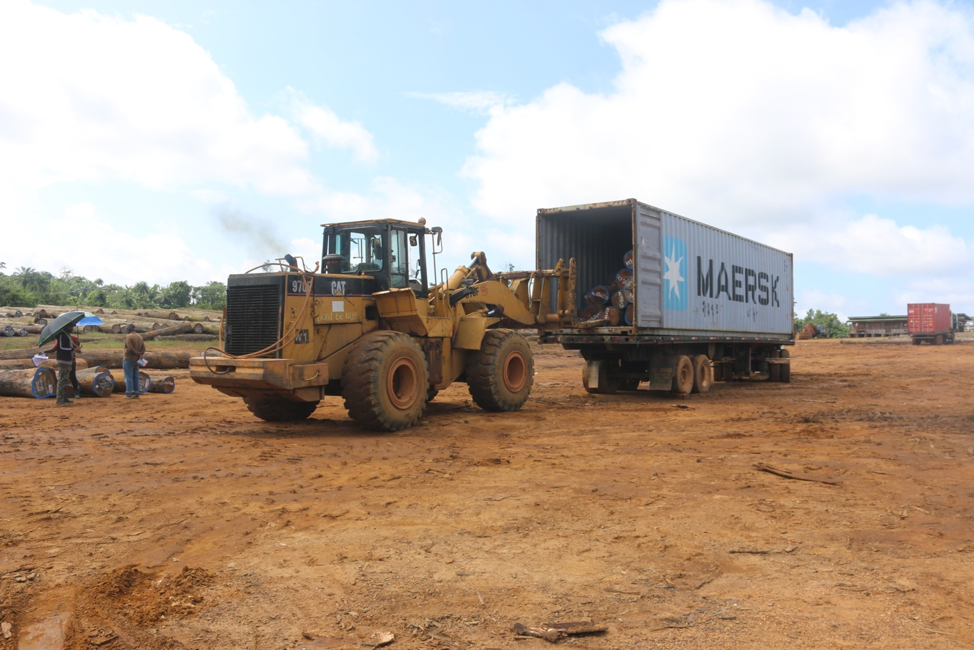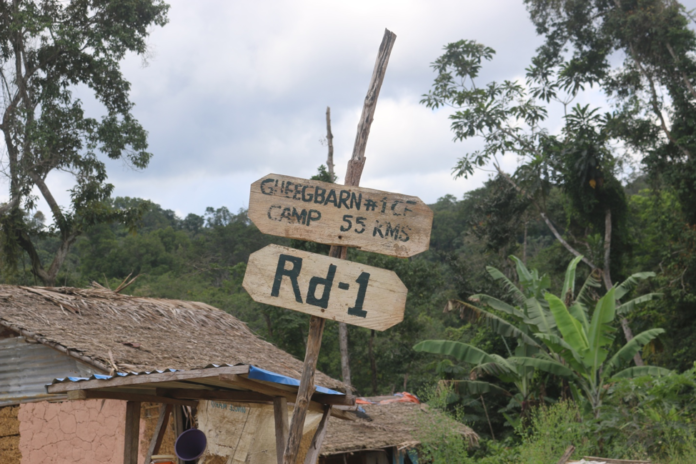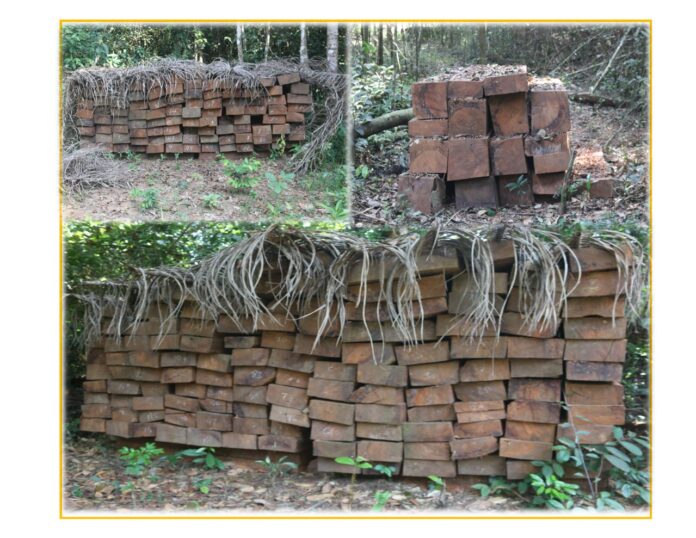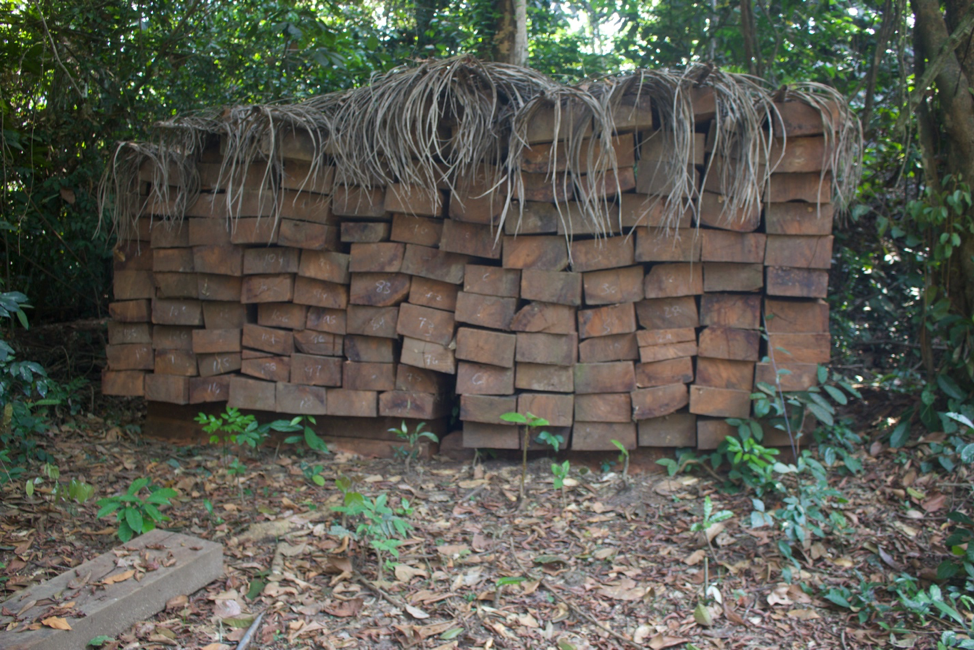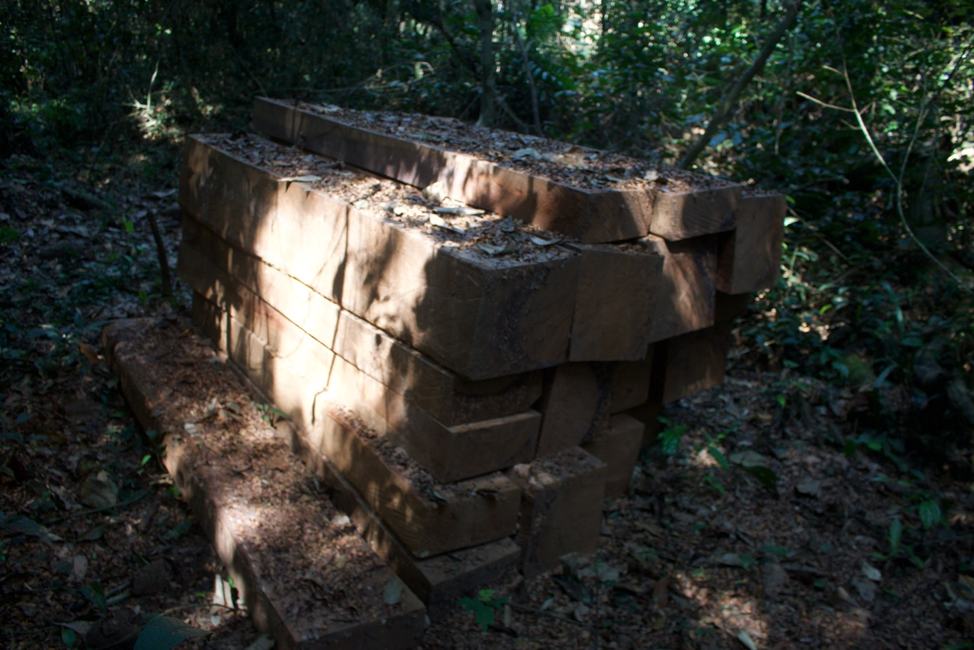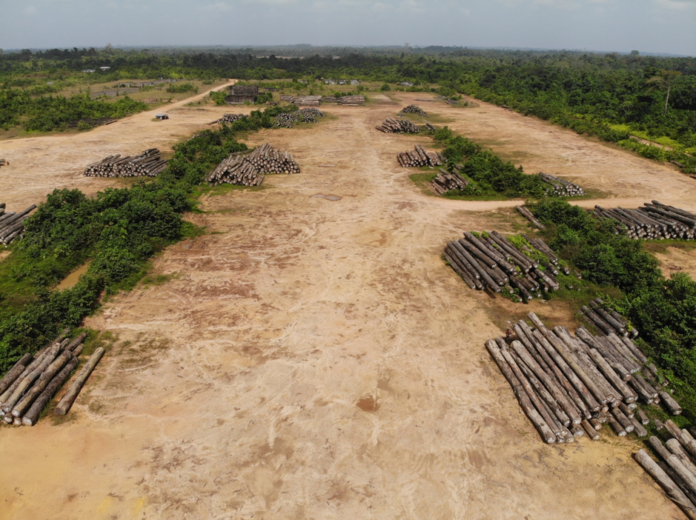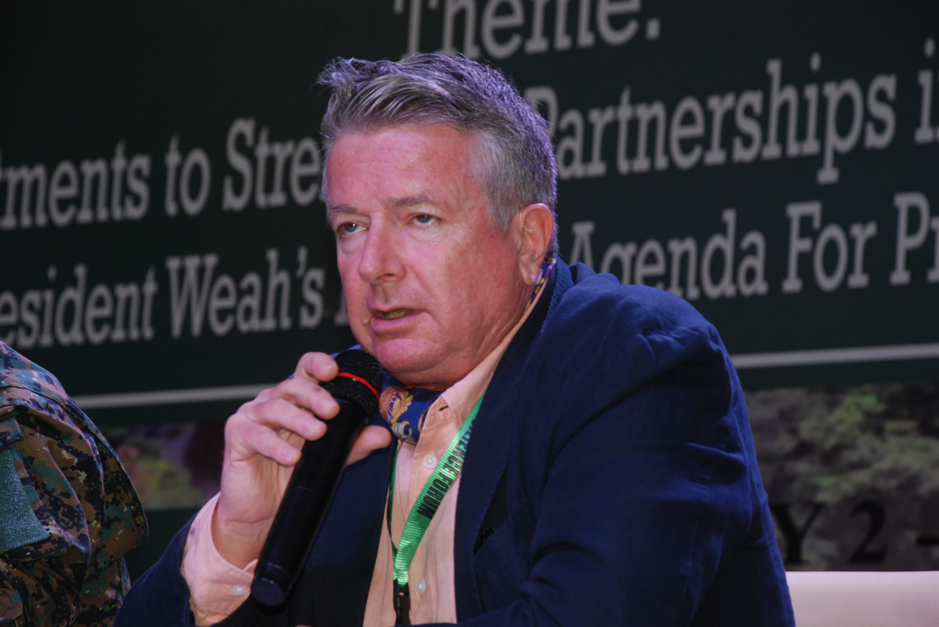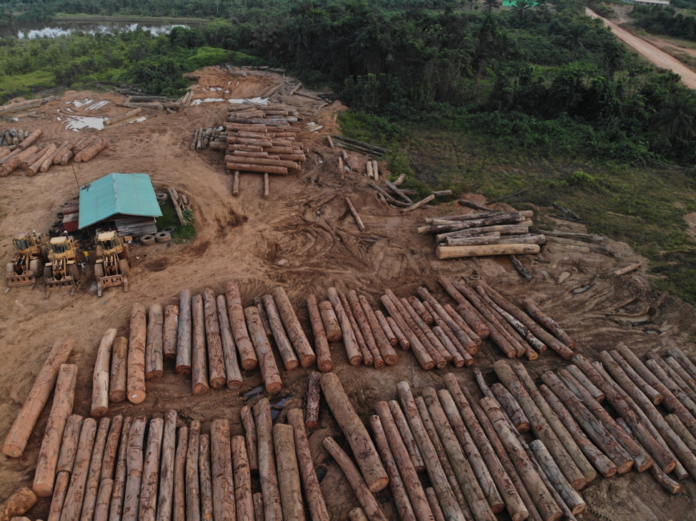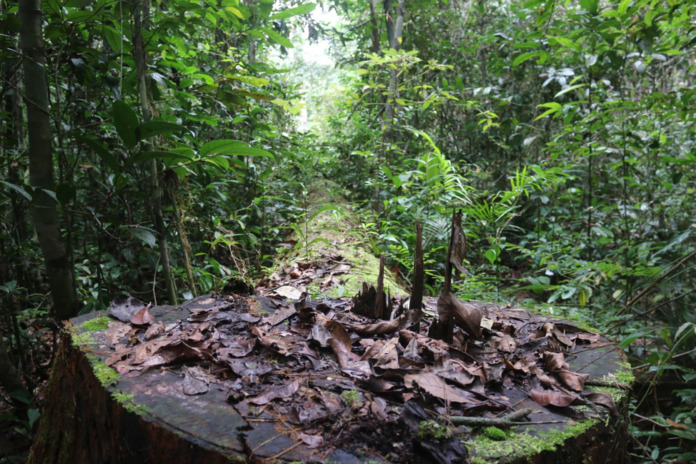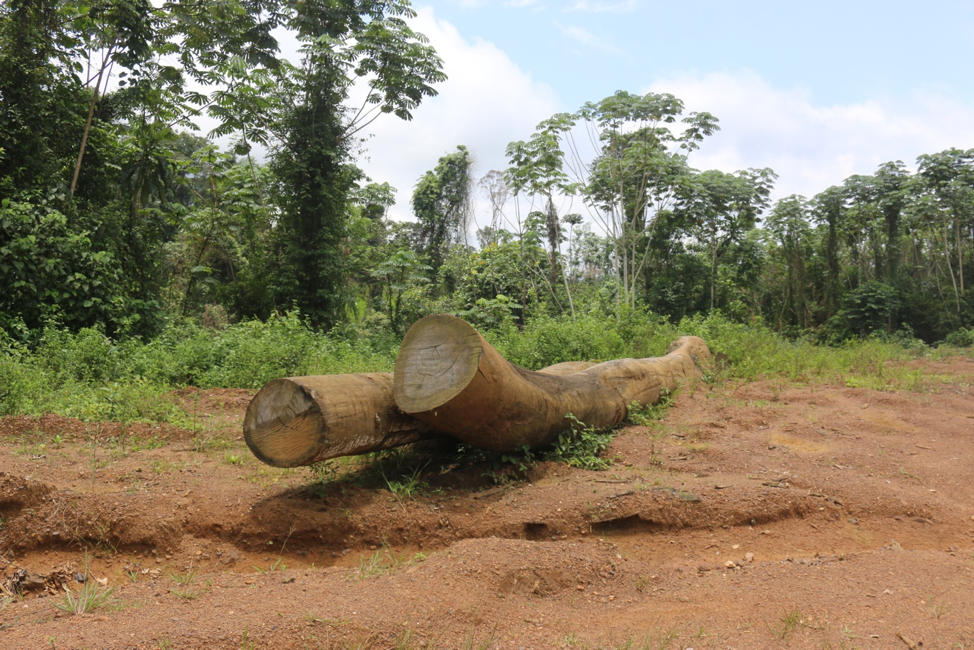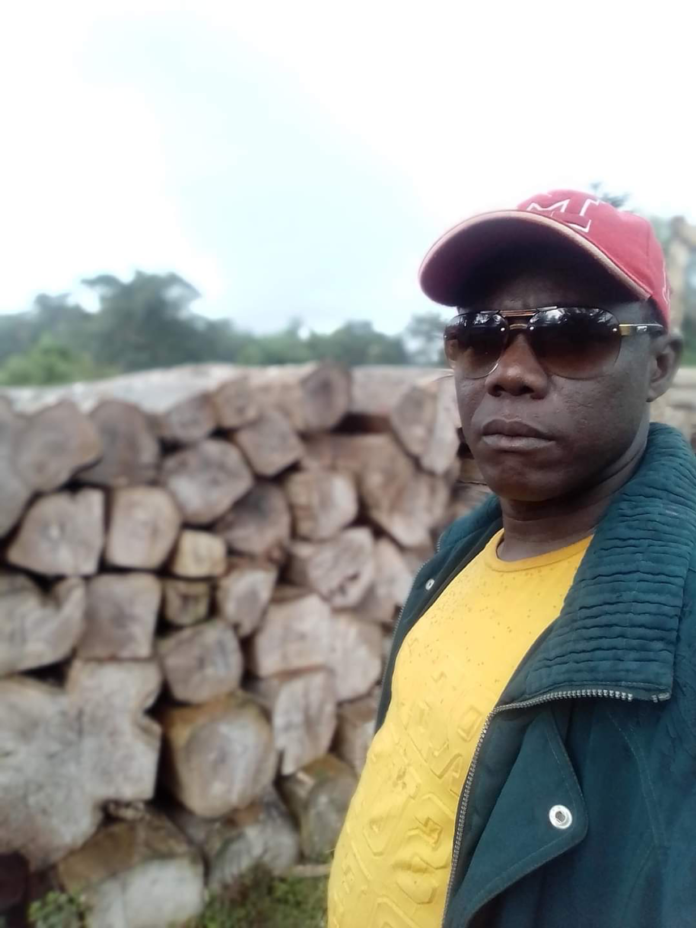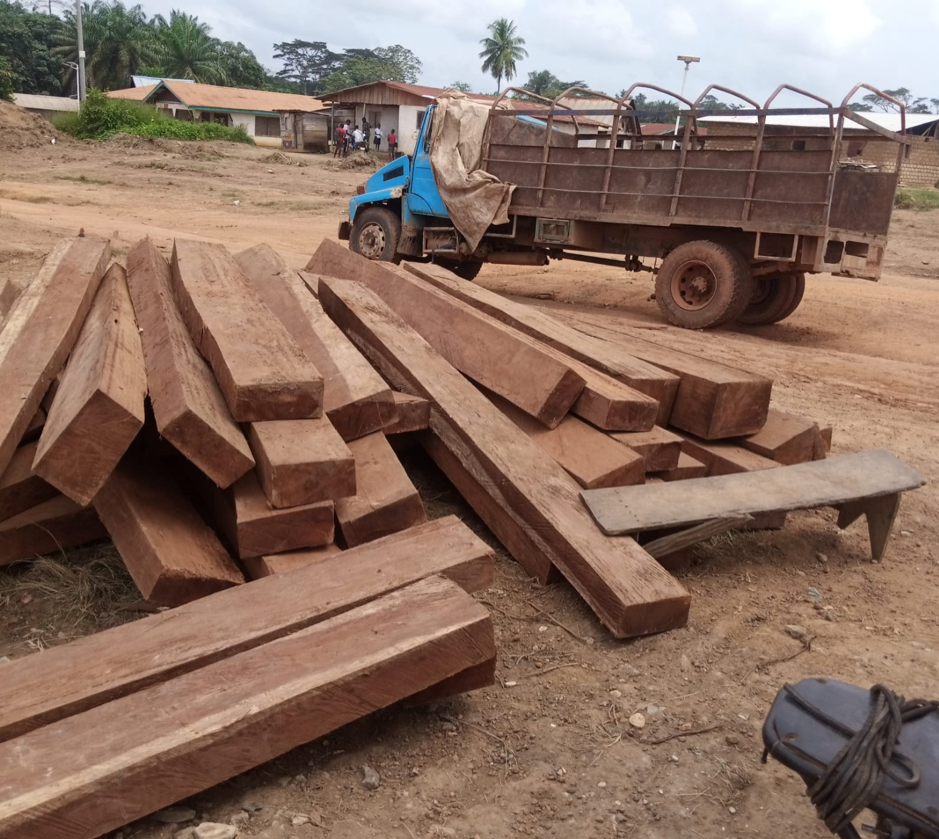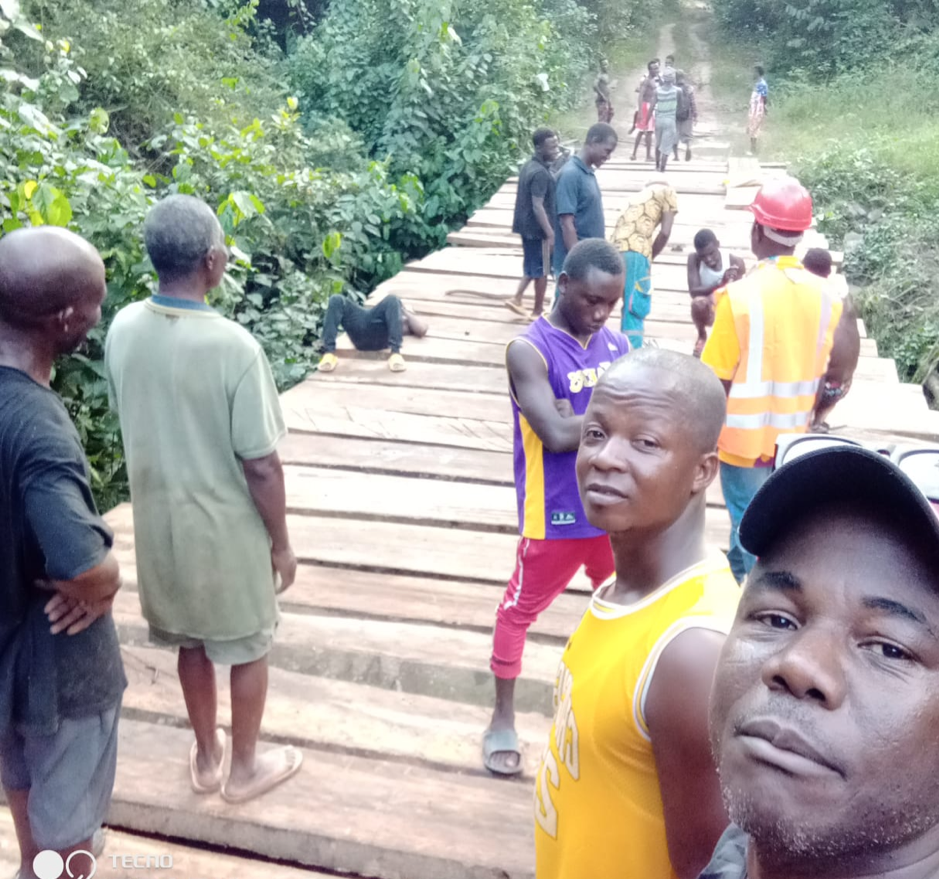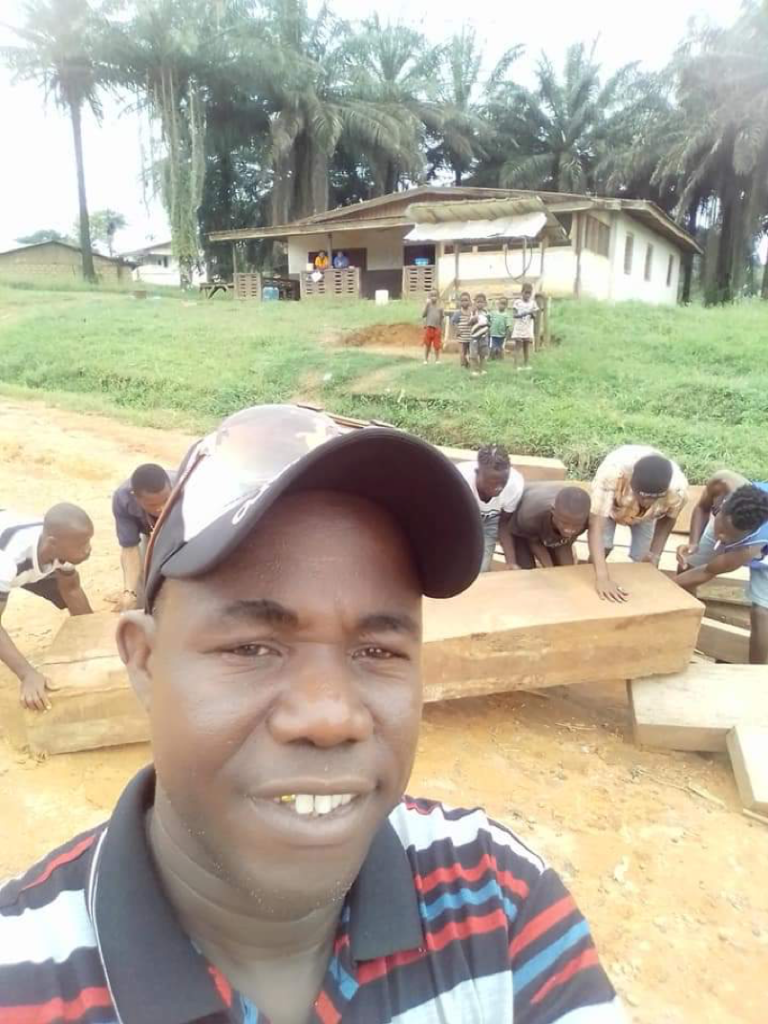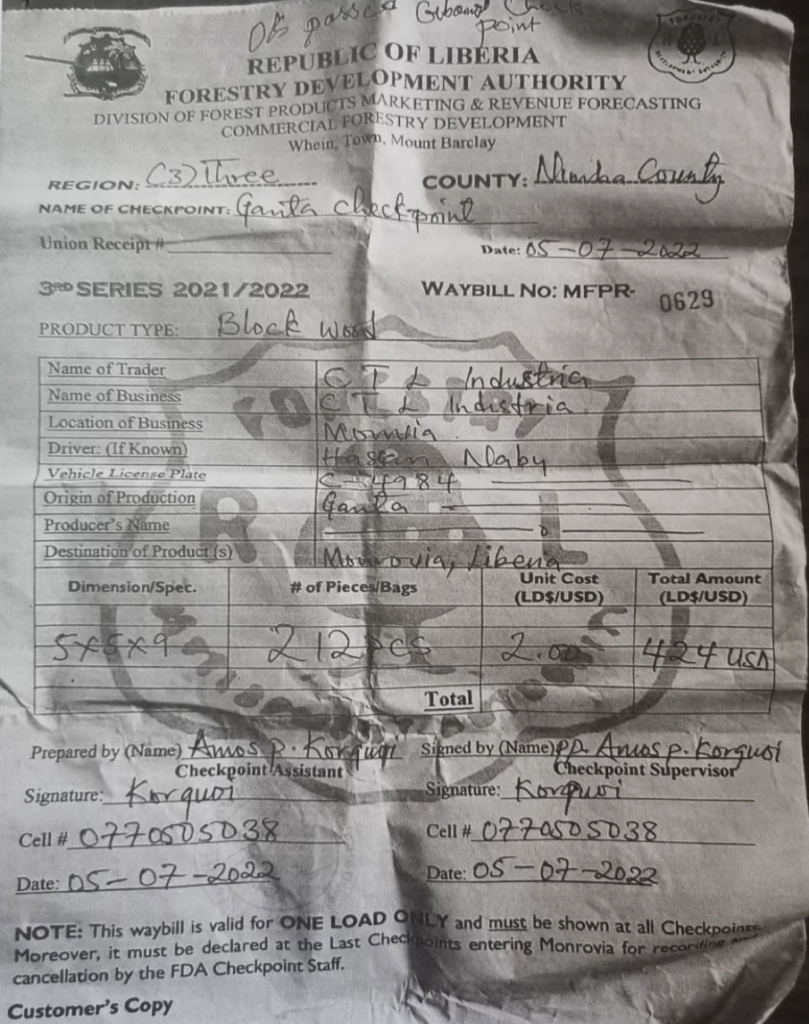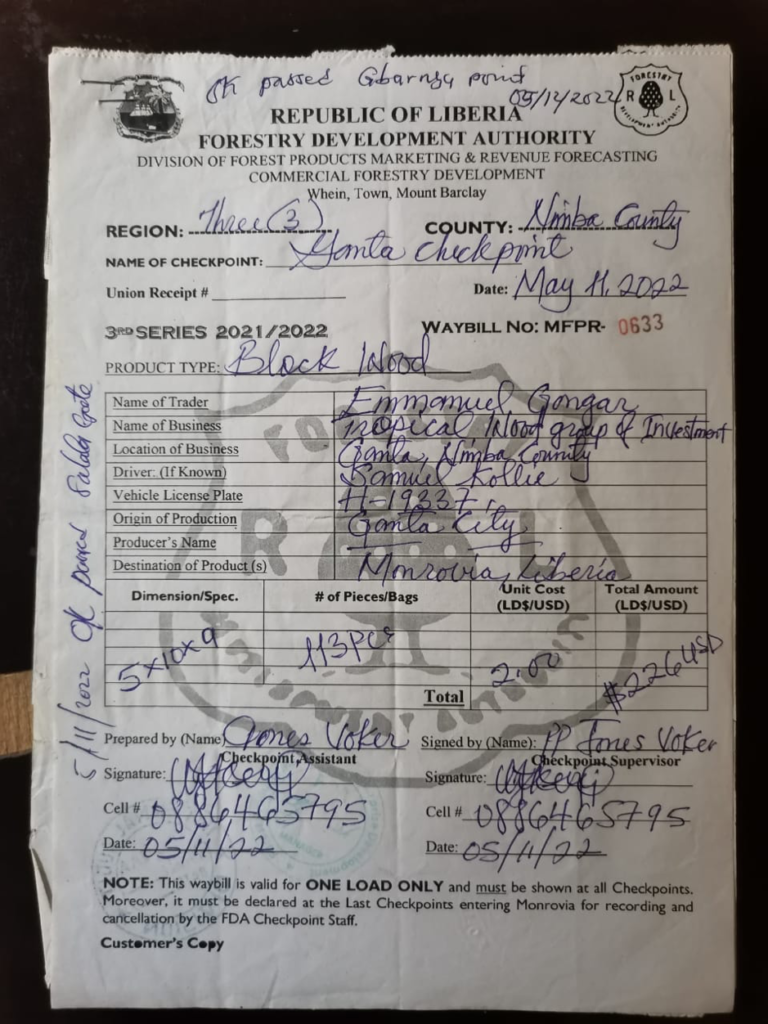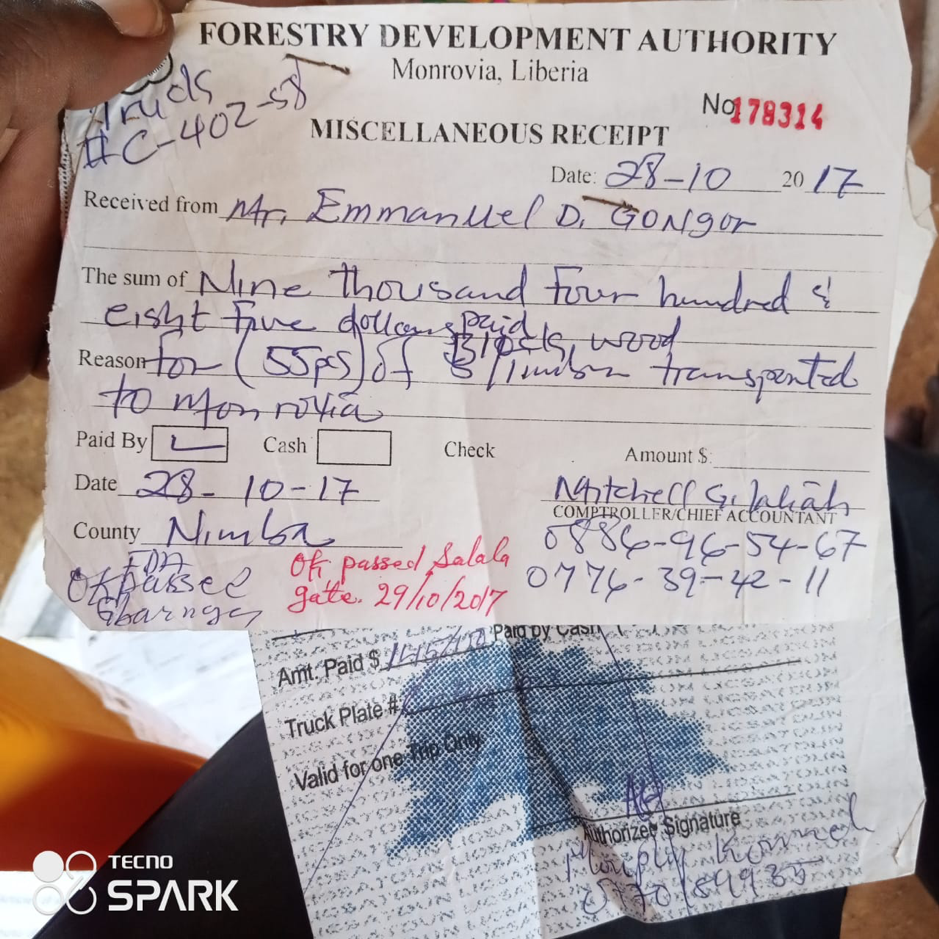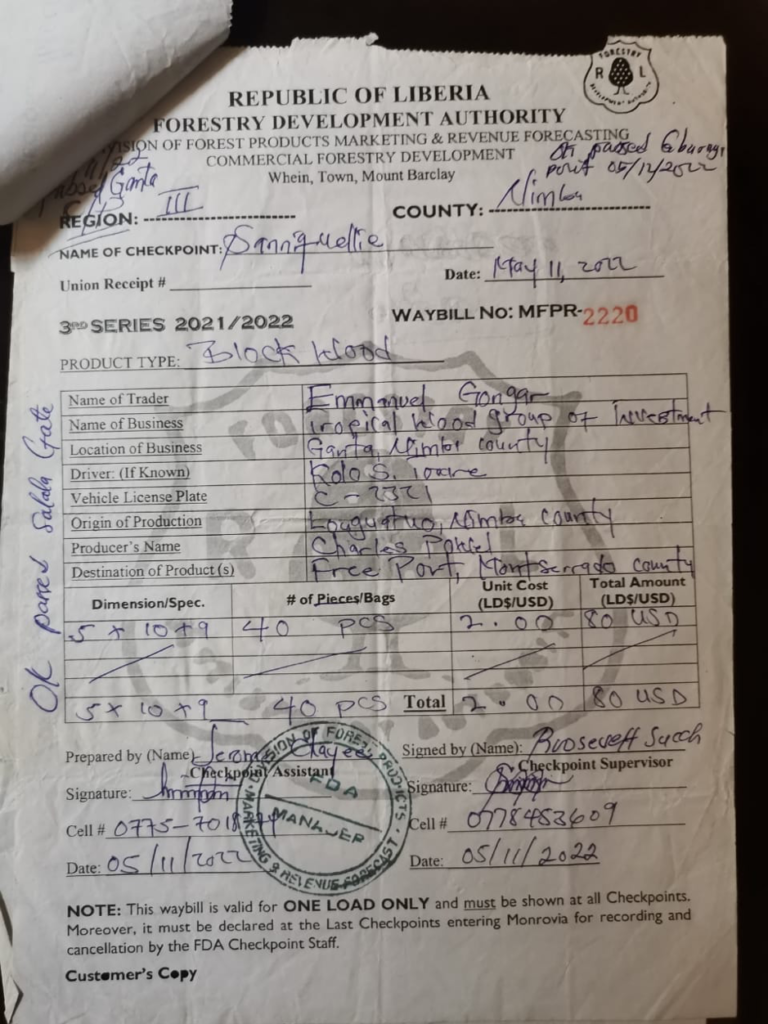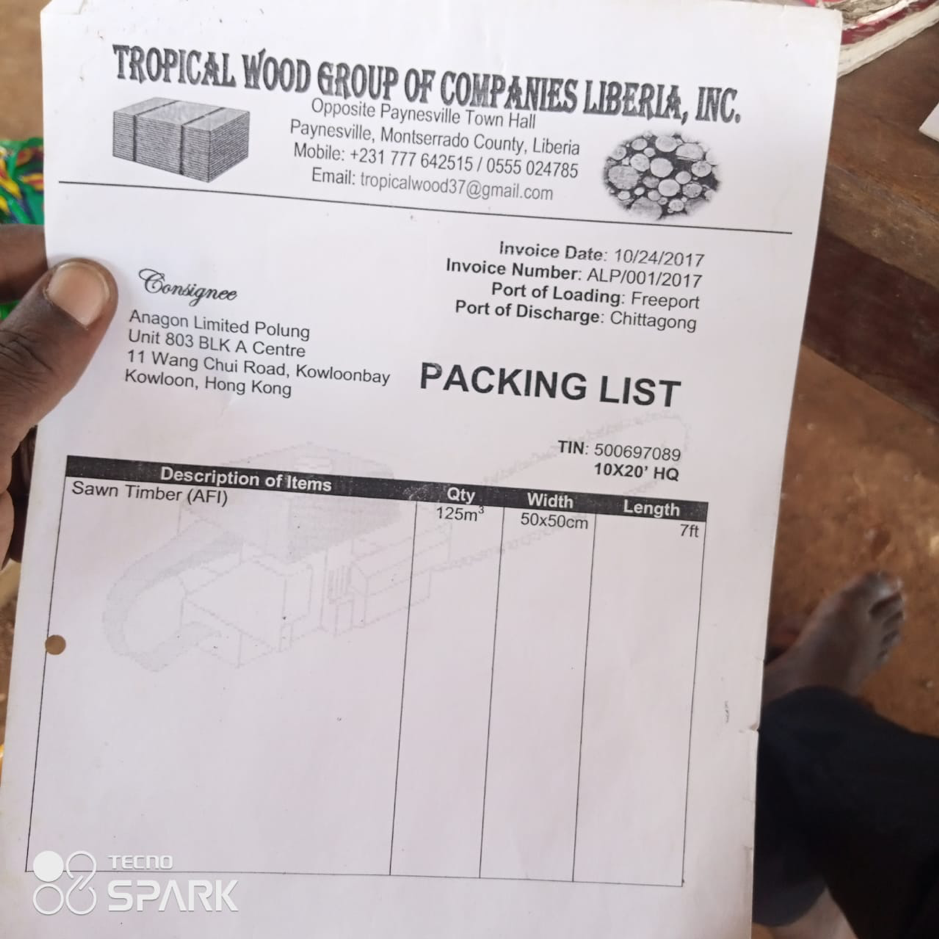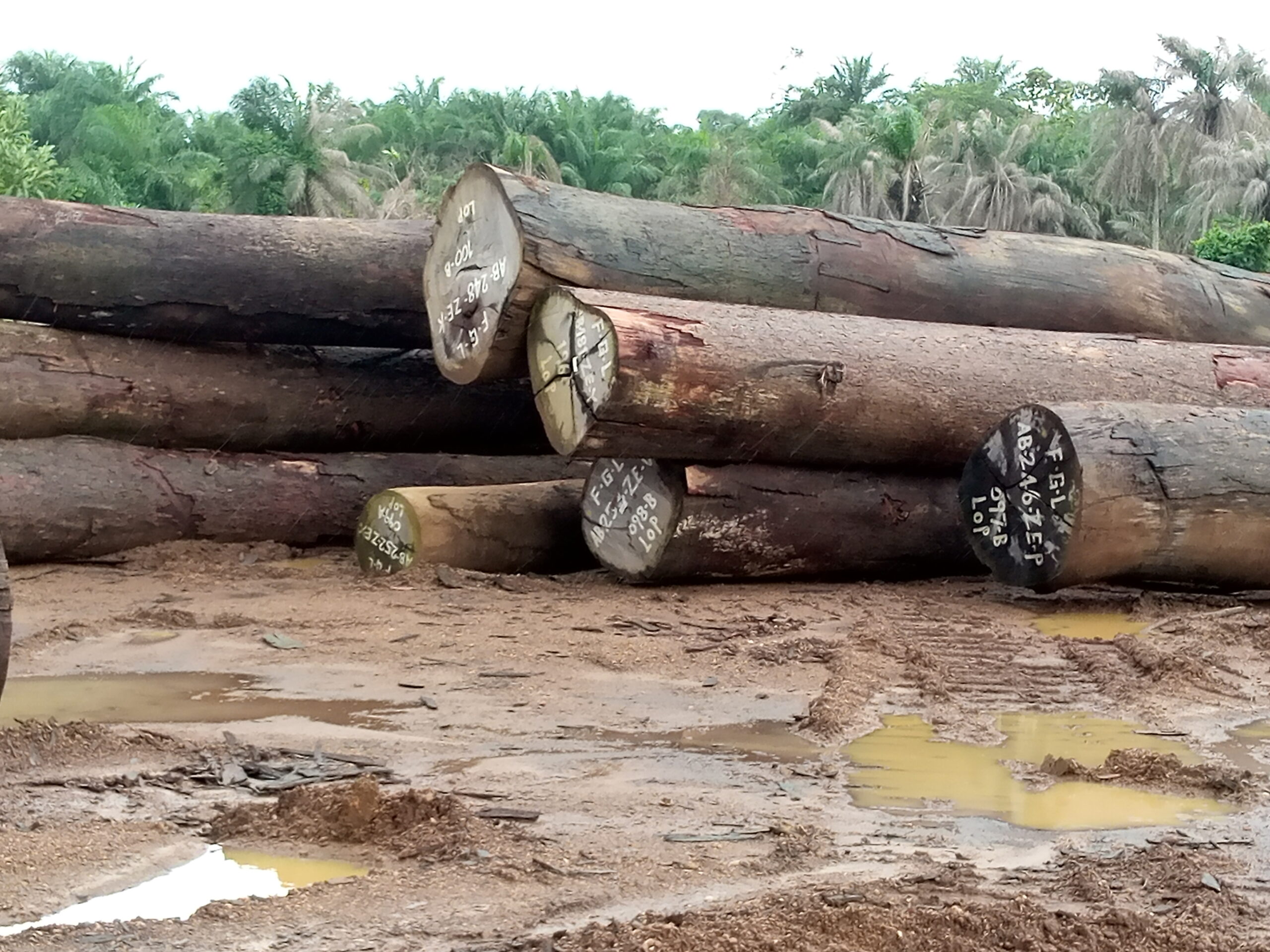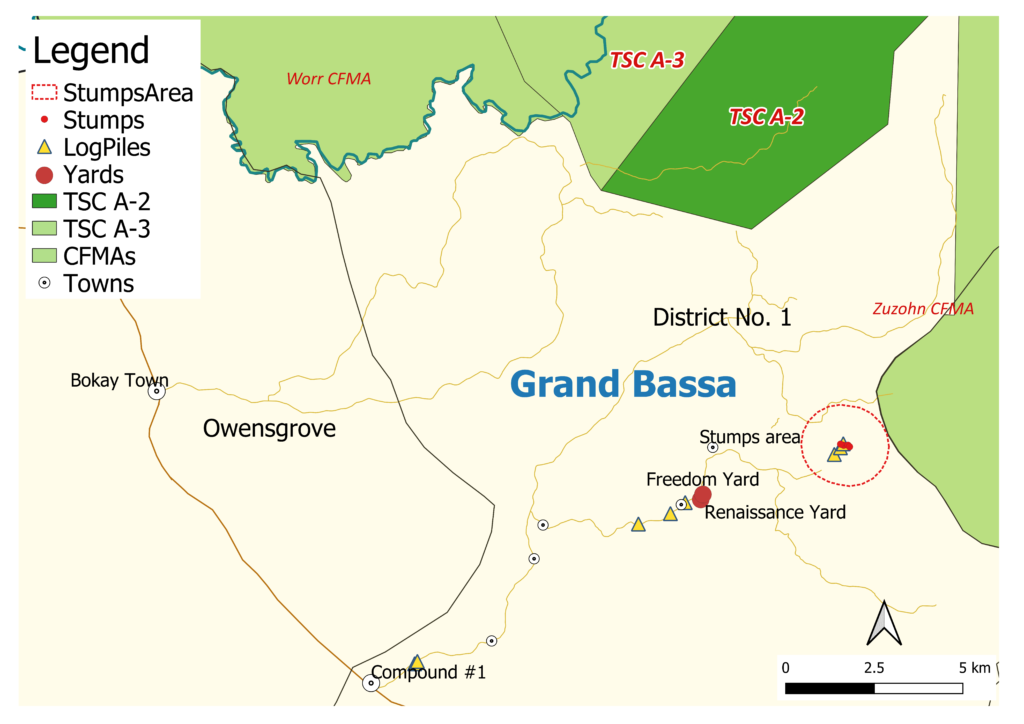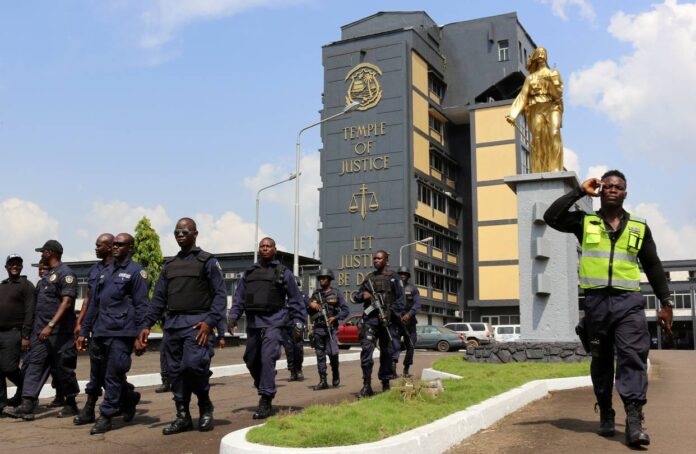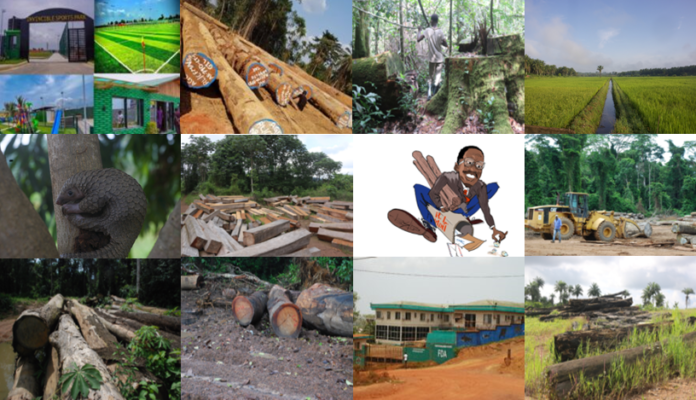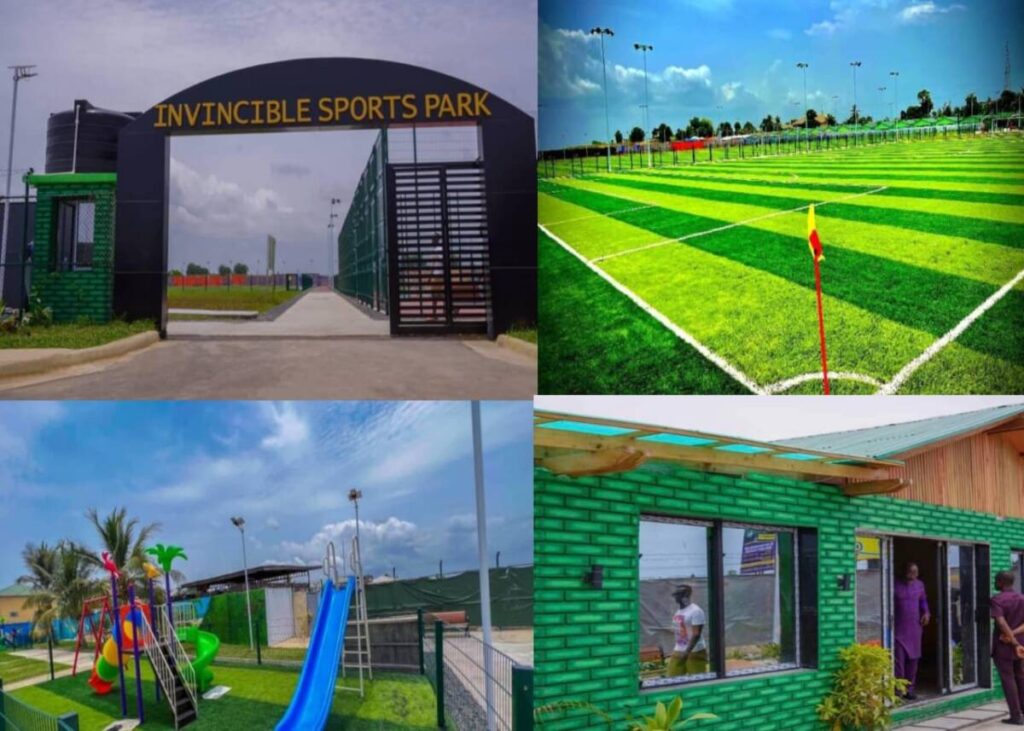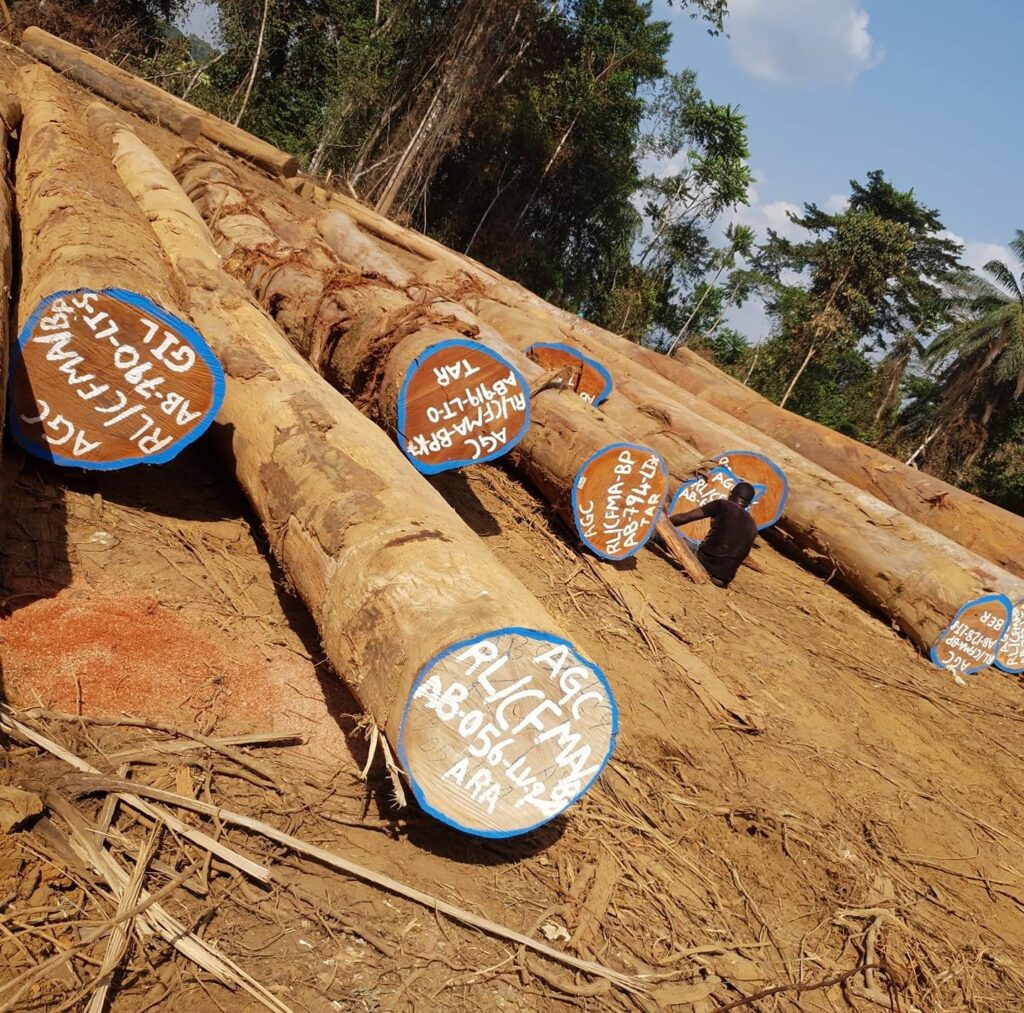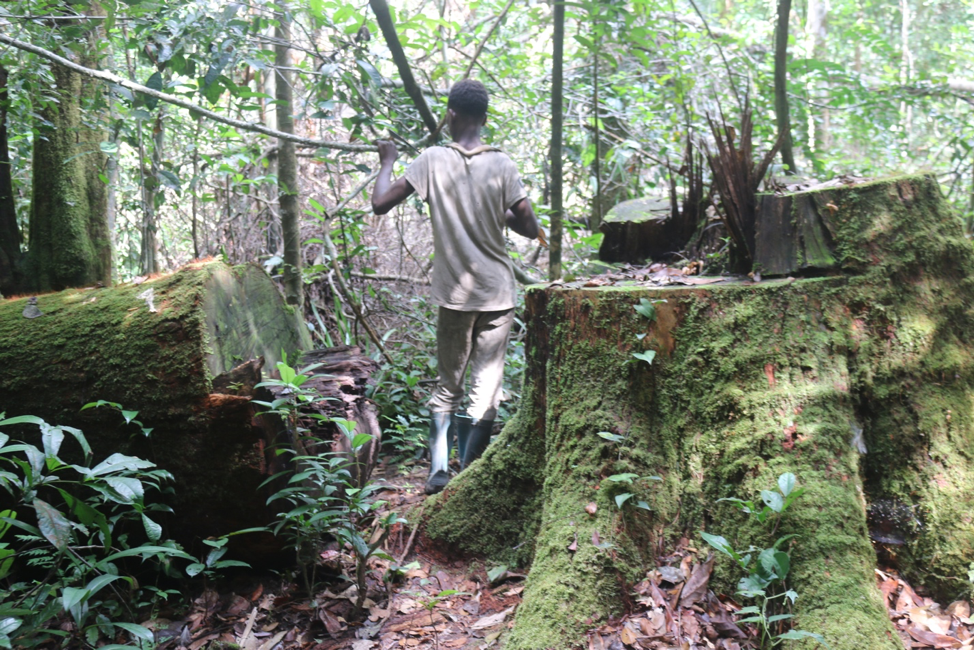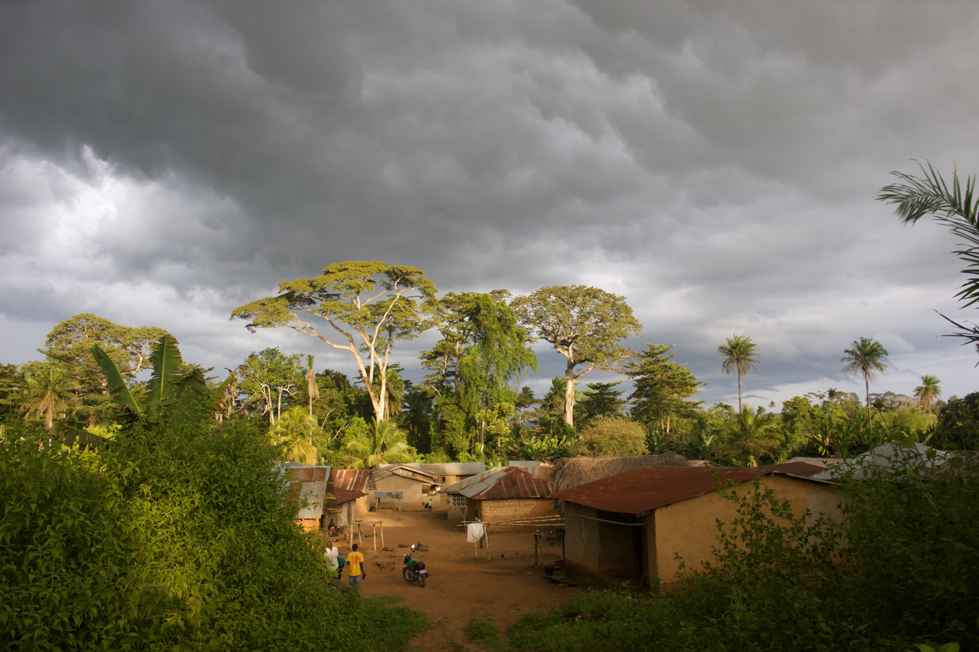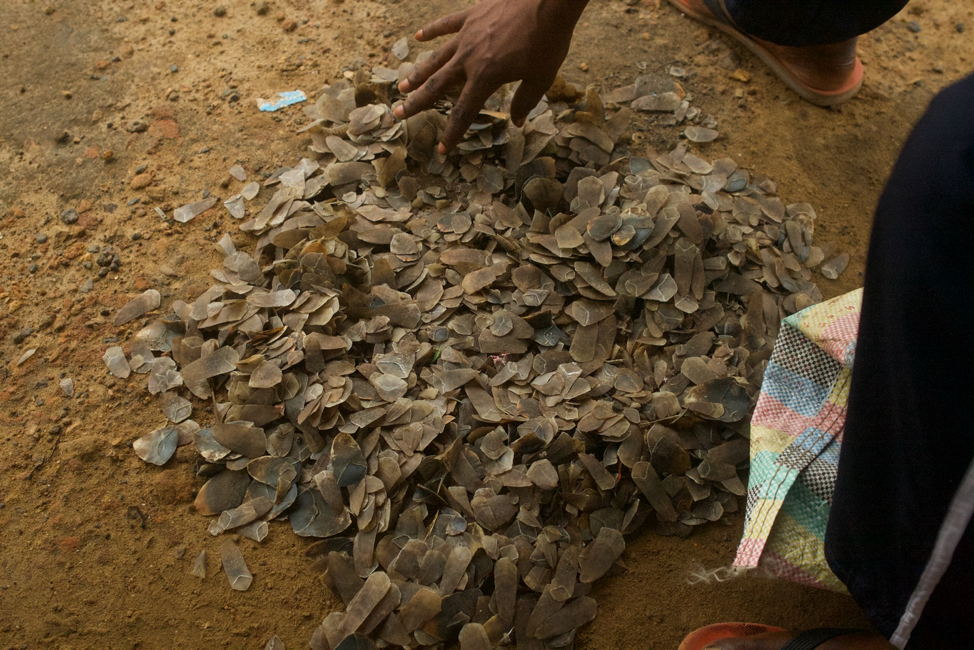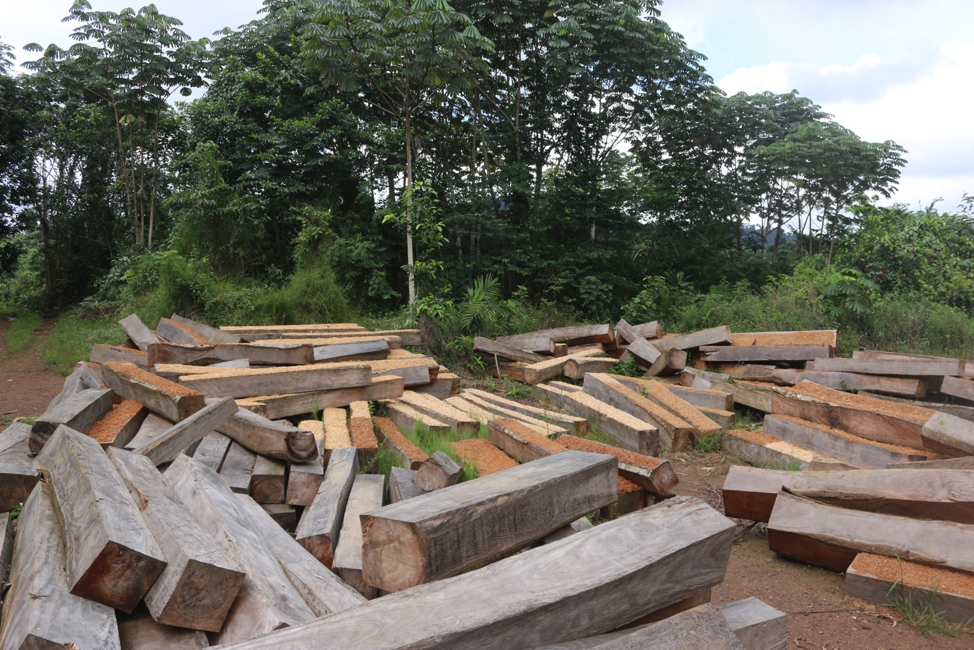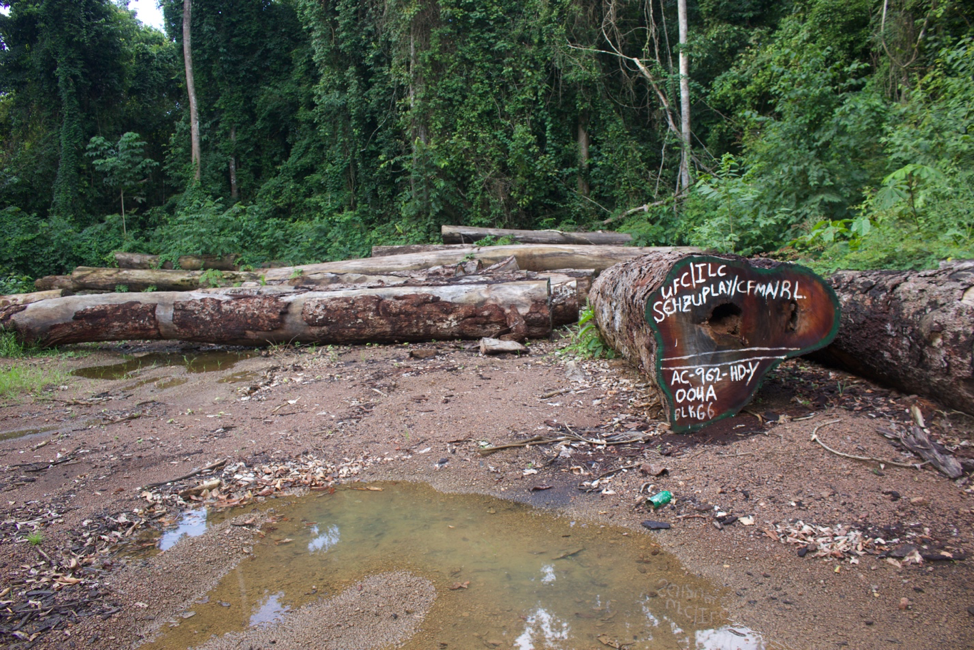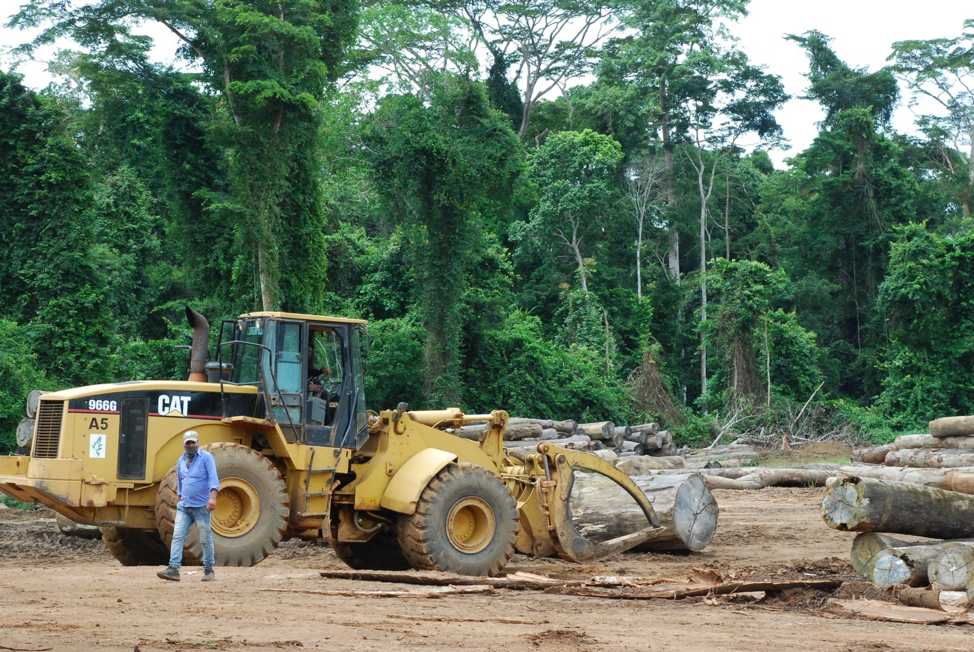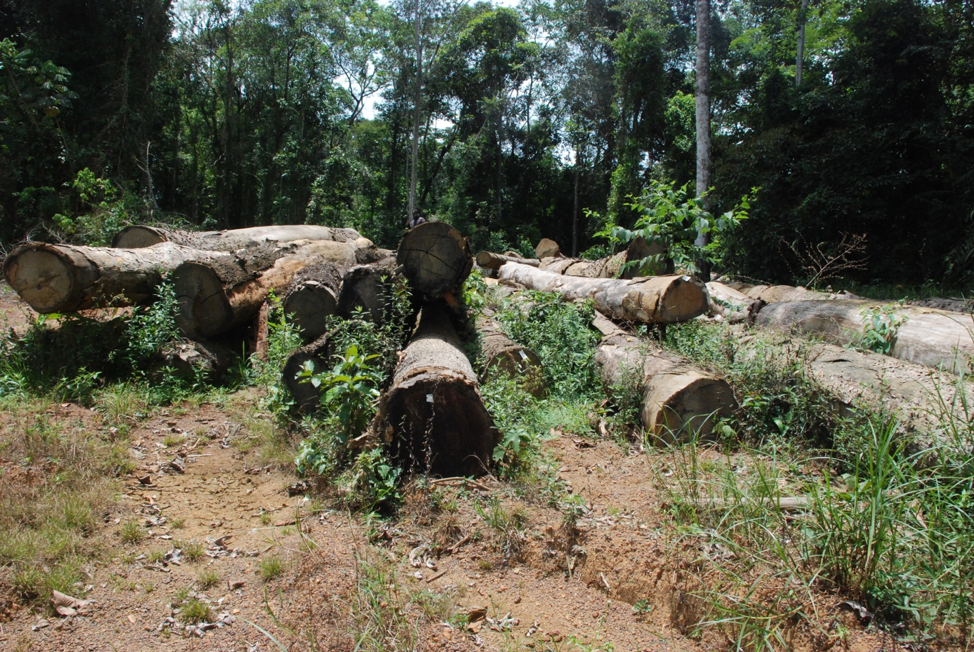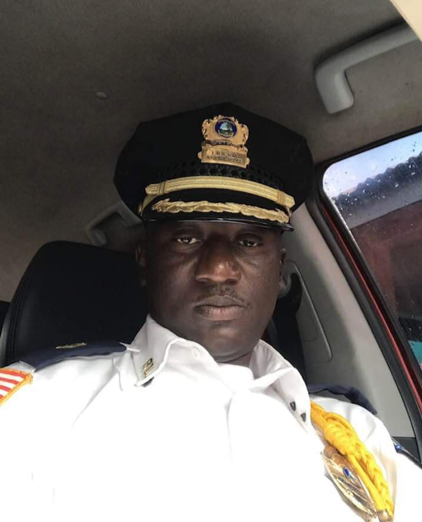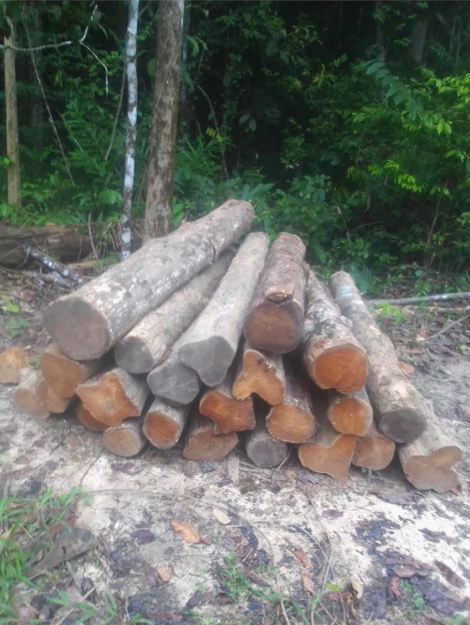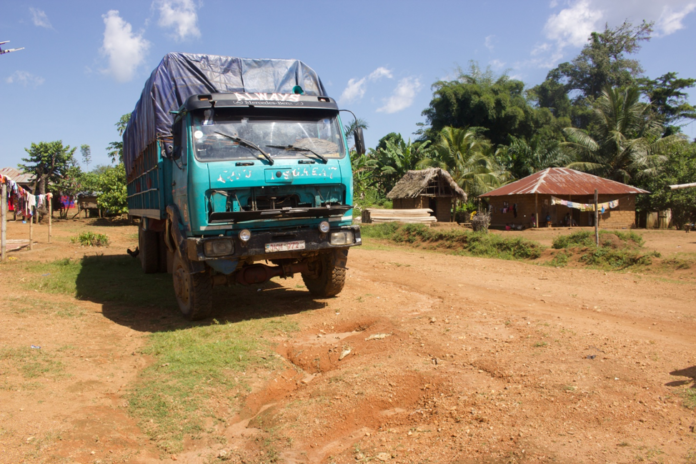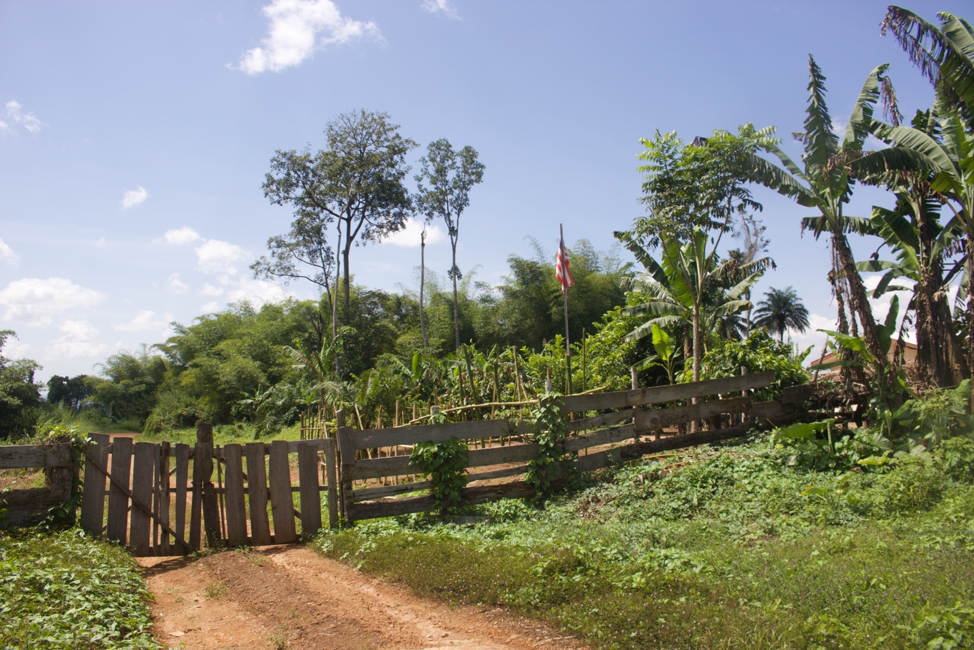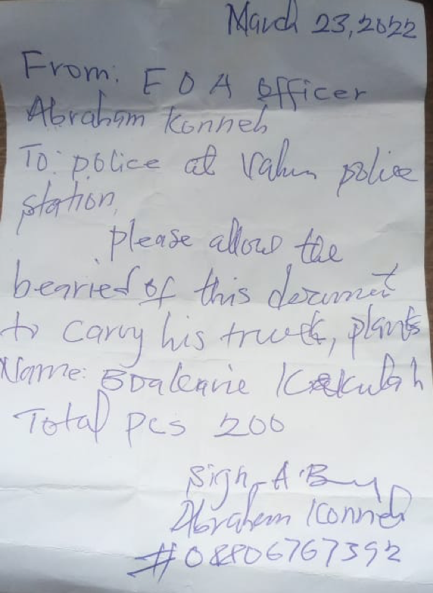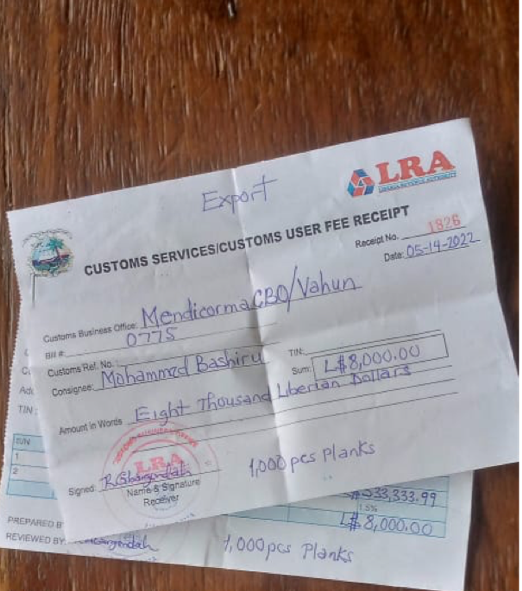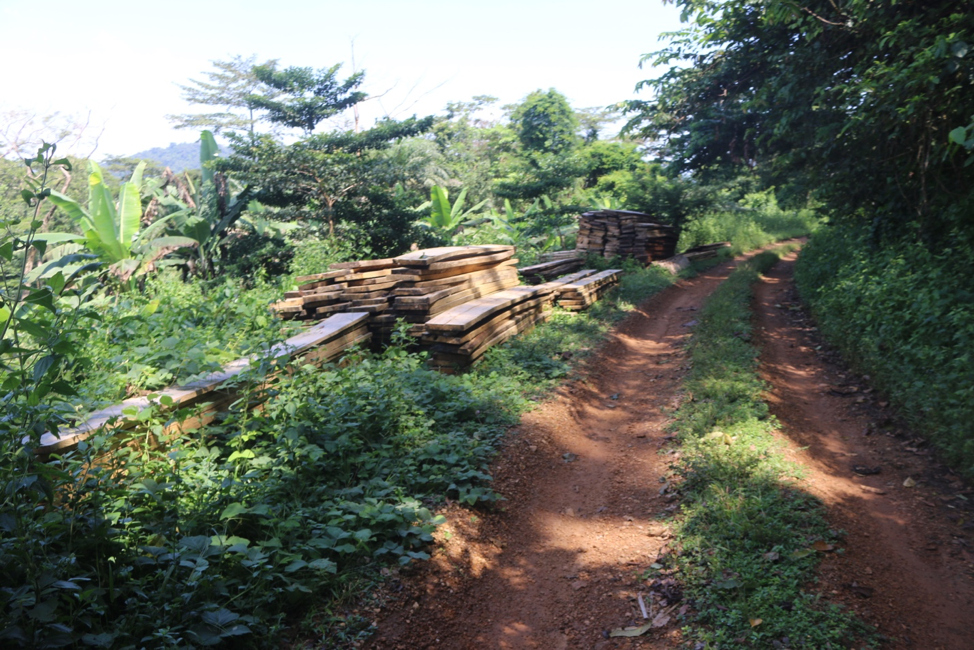Top: A signboard at a logging company’s camp in the Gheebarn #1 Community Forest in Compound Number Two, Grand Bassa County. The DayLight/James Harding Giahyue
By James Harding Giahyue
COMPOUND NUMBER TWO, Grand Bassa County – Five ambassadors organized an exchange among locals, a logging company and the Forestry Development Authority (FDA) to get the gist of the challenges of community forestry.
It took one and a half hours for the envoys from the European Union, Sweden, France, Germany and Ireland to get what they were looking for. Leaders of the Gheegbarn Community Forest and West Africa Development Incorporated (WAFDI)—and the FDA—presented a perfect picture of one of forestry’s most problematic contracts. Each of the three actors took open aims at one another, as they entertained questions from the ambassadors.
The ambassadors on the visit were Laurent Delahousse of the European Union, Urban Sjöström of Sweden, Jacob Haselhuber of Germany, Michael Roux of France, and Gerard Considine of Ireland. The spouses of the five men also graced the occasion.
Larry Tuning, a member of Gheegbarn’s community forest leadership, started with WAFDI’s unfulfilled required projects in their December 2018 agreement. He criticized the company for not paving farm-to-market roads, erecting schools clinics and handpumps, and underwriting the costs of quarterly meetings. He, however, praised the company for meeting scholarship, land rental and log-harvesting payments.
Asked whether he would recommend commercial logging in community forestry, Tuning’s response was obvious. “It is hard for me to tell my friends to say ‘Get into it,’ because I [am] facing too many problems,” Tuning added as staff of WAFDI, sitting opposite looked on. “Instead of going into logging if had the support I would go into conservation.” Community forestry is a crucial part of Liberian forestry, giving rural communities the right to comanage their forests.
‘Let them go’
Tuning continued for several minutes, tearing into WAFDI on labor issues. He said the company had contravened a clause in their agreement, which mandates it to employ 60 percent of its workforce from the community. Dugbormar Kwekeh, another member of the community leadership buttressed his comments—and in a dramatic fashion, too.
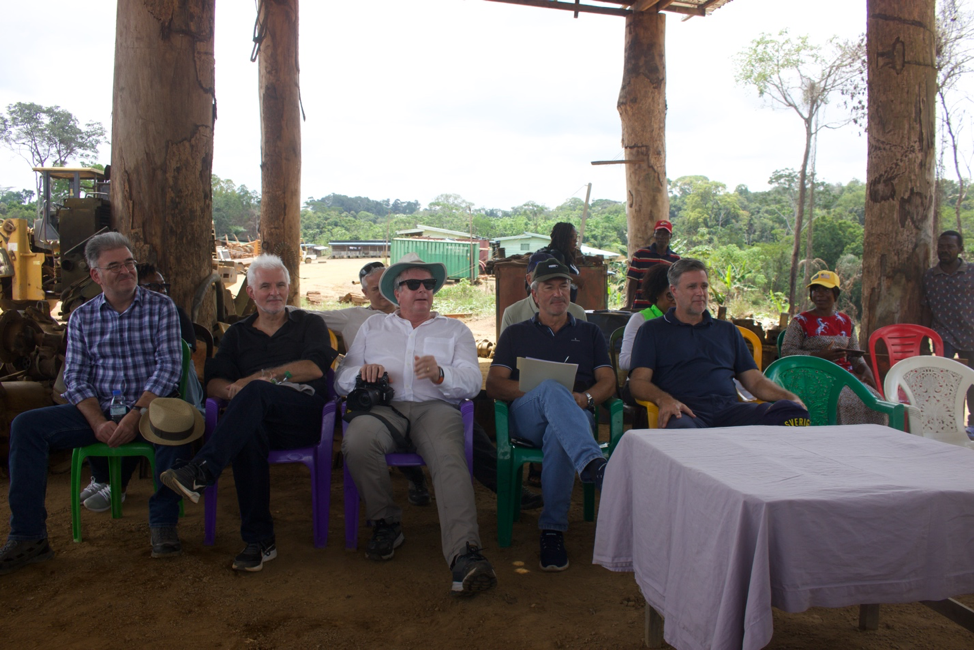
“They are just extracting our logs and there is nothing we are benefiting from,” Kwekeh said in Bassa through an interpreter. Gesturing as she went along, with an audible voice, she expressed frustration and fury. “The company came to subject us to poverty. “Let them go from here. Another company can take us from poverty.”
Gualberto Ojo, a Filipino who represented WAFDI in the meeting, denied preventing locals from farming. In fact, he accused them of farming on a portion of the 26,363 hectares of forestland they contracted to the company in Compound Number Two, Grand Bassa County.
“The company cannot stop the community people from farming; is not for us to say that it is the source of living,” said Ojo. “Most part of the forest is all farming activities, so because of this and other reasons the forest is not really productive.
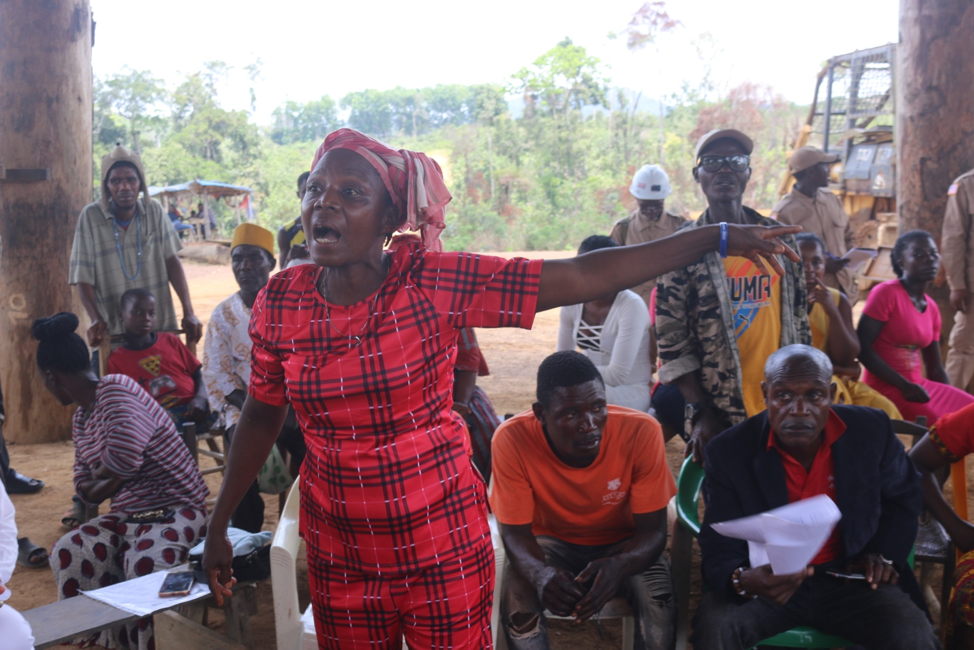
Pit-sawing
Before responding to Kwekeh’s comments, Ojo took a well-timed swipe at Tuning, who is a chainsaw miller. Tuning’s mention of pit-sawing had led to indistinct muttering among FDA representatives at the meeting. Also called pit-sawing, chainsaw milling began after the Second Liberian Civil War (1999-2003), and efforts to regulate the sub-sector have failed so far. It has wreaked havoc in forests across the country. Ojo, said, that included Gheegbarn #1.
“Pit-sawing is one major challenge; it has taken over the forest,” Ojo said, who said he first spotted the illegal activities in 2020. He said WAFDI had told the FDA about it. “People are doing pit-sawing all in the forest now.”
Human settlements and factors affecting the global logging industry were other issues, according to Ojo. A company representative said there were people from the neighboring Bong County living in the forest, and that the coronavirus and the ongoing U.S.-China trade war.
“During that four years the market on round logs collapsed totally,” Ojo told the diplomats.
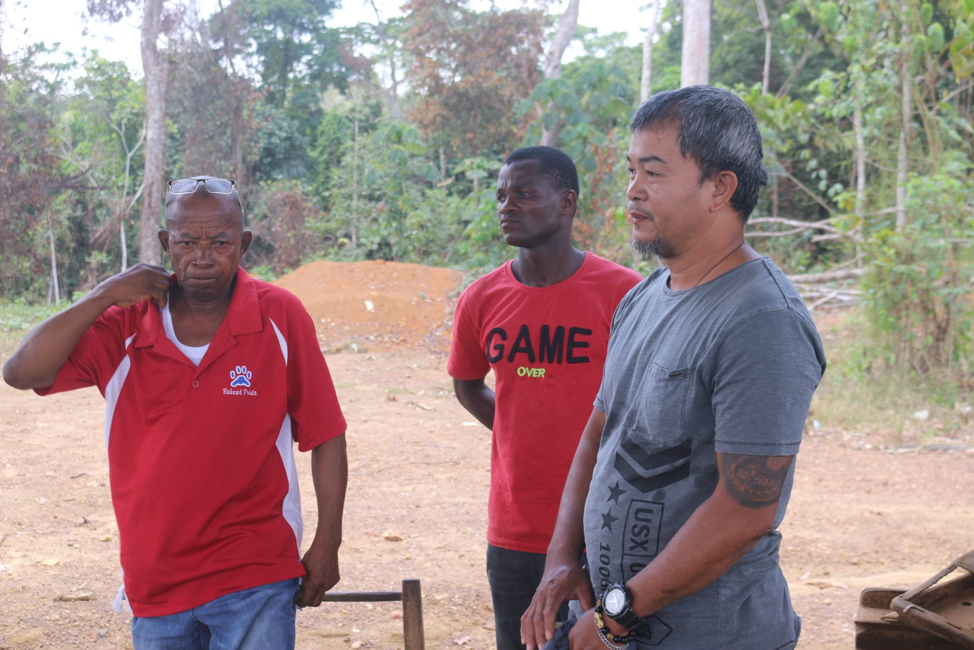
‘We were like turtles’
Then entered the FDA, represented by Deputy Managing Director for Operations Joseph Tally and a host of top-level managers. There was an announcement from Weedor Gray, the technical manager of the community forestry department for periodic reports from communities. And more questions came.
“Have you ever come to the FDA to request for harvesting or export data?” Gertrude Nyaley, the technical manager for the legality verification department, asked Tuning. Nyaley’s rhetorical question was a response to Tuning’s earlier reply to an envoy about WAFDI’s production and export records. Tuning had said the community did not get the documents, and only accepted fees the company paid. Production records, in particular, are crucial in calculating harvesting payments, known in the industry as cubic meter fees.
Nyaley further pressed Tuning whether he and Gheegbarn’s leadership had informed the townspeople of a US$18,000 WAFDI paid. That question caused a stir among villagers at the event. Tuning encountered a rebuke from a local named Sylvester Williams, who had suggested community benefits were being misused. William disagreed with Tuning that the leadership supported villagers’ farming activities, bursting into a peal of frenzied laughter. Tuning said Williams was busy with his motorcycle taxi and was unaware of community matters. That pushed the community forestry drama to its highest peak. In a phone interview with The DayLight on Sunday, Tuning denied misapplying the fund, saying the leadership had already informed the community about the payment.
Tally, dressed in khaki uniform like all the managers of the FDA, thanked the European ambassadors for the event. “We were like turtles, and you put fire on our backs,” he said.
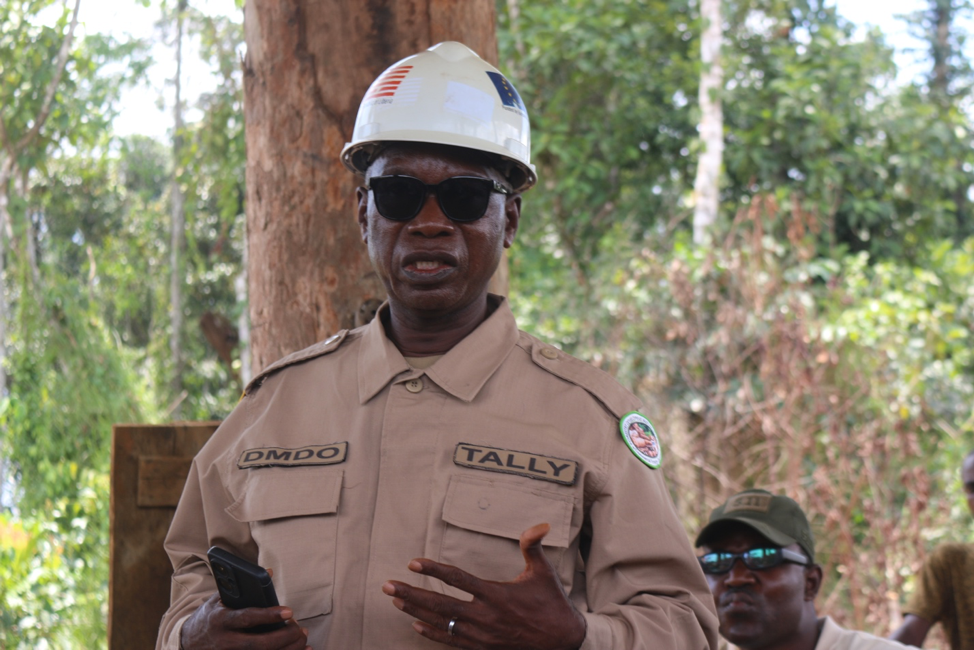
Tally’s comments were a reference to criticisms of the rise in forestry violations and the trade of illegal timber. Both the national and international media have published reports of logging wrongdoings, involving the FDA. It was a major issue at last month’s forest and climate forum, where Liberia reassured its commitment to combat illegal logging and climate change in its pursuit of climate financing.
But talking about the correction of past wrongdoings, Gheegbarn #1 was the right place for Tally and his team. Last year, a Ministry of Justice investigation found the FDA awarded WAFDI excess forest blocks. The report, seen by The DayLight, cut the deal between the company and the community from 15 to seven years. Several senior managers were replaced in the fallout of the scandal. The parties have signed a new agreement.
Conservation
Delahousse said the delegation had not come to condemn any of the actors. “This was not a trial of the company. This is a fact-finding information mission, and for us, it was very important to be here and to hear all the various stakeholders,” said Delahousse.
Delahousse said he learned that community forestry was “complicated,” a “bit of a bobble,” and lacked transparency. He urged communities to consider conservation programs instead. Of the dozens of community forests, only a few have a conservation management program. Others have scrapped it to accommodate mining.
“We need to work also on seeing how conservation can be an alternative for some communities,” Delahousse said. “Maybe they can make more money from conservation.”
After the meeting, the ambassadors and their entourage toured a portion of Gheegbarn Community Forest with the FDA. The visit ended with a trip to the log yard of Kisvan in Buchanan, which operates in the Central Morweh Community Forest in River Cess.
